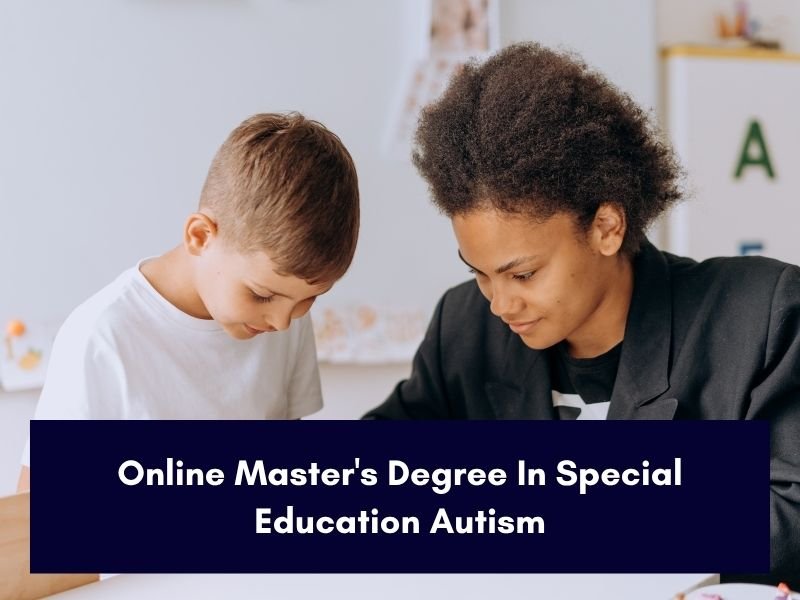The demand for skilled educators who can support students with autism and other developmental differences has never been greater. Earning an online master’s degree in special education with a focus on autism offers you the flexibility to advance your career while making a meaningful impact in the lives of neurodiverse learners.
This specialized graduate program equips educators, therapists, and support professionals with evidence-based strategies, inclusive teaching methodologies, and the credentials needed to lead in both public and private educational settings.
Whether you’re already working in special education or transitioning from another field, an online degree offers the convenience of remote learning without sacrificing quality. In this guide, we’ll explore top programs, career outcomes, coursework, and what to expect from pursuing your master’s in autism-focused special education online.
What is an Online Master’s Degree in Special Education Autism?
An online Master’s degree in Special Education with a focus on autism equips educators and professionals with advanced skills to support individuals with ASD in educational, clinical, and community settings. These programs blend evidence-based practices, behavioral strategies, and inclusive teaching methods, often covering topics like autism characteristics, assessment techniques, and intervention strategies. Delivered through flexible online platforms, they allow working professionals to balance coursework with their careers, typically completing degrees in 1-2 years. Many programs also offer pathways to certifications like the Board Certified Behavior Analyst (BCBA) credential or state-specific autism endorsements, enhancing career versatility.
Top institutions offering these programs include:
-
University of Kansas – Offers a Master of Science in Education with an autism spectrum disorder emphasis, focusing on evidence-based interventions and social skill development.
-
Arizona State University – Provides a Master of Arts in Special Education with an ASD concentration, including a practicum for hands-on experience.
-
University of Missouri (Mizzou) – Features a Master of Education in Special Education with an autism emphasis, designed for educators and counselors.
-
University of Texas Permian Basin – Integrates AI tools into its Master of Arts in Special Education, Autism Spectrum Disorders track, with a practicum capstone.
-
Michigan State University – Offers a Master of Arts in Applied Behavior Analysis and Autism Spectrum Disorders, preparing students for BCBA certification.
-
Florida International University – Provides a Master of Science in Special Education with a Florida Autism Endorsement, focusing on culturally diverse learners.
-
Bowling Green State University (BGSU) – Delivers a Master of Education in Special Education with an ASD focus, including a certificate option.
-
University of Massachusetts Global – Offers a Master of Arts in Education with an autism emphasis, requiring fieldwork with ASD students.
-
Youngstown State University (YSU) – Provides a Master of Science in Education in Special Education, Autism and Related Disabilities, with no teaching certificate required for admission.
-
George Mason University – Features a Master of Education in Special Education with an autism certificate, emphasizing lifespan support.
Benefits of Pursuing an Online Master’s in Special Education Autism
The flexibility of online learning is a game-changer for busy professionals. These programs allow you to study at your own pace, often with asynchronous courses, making it easier to balance work, family, and education. Many programs incorporate practical components like practicums or fieldwork, ensuring real-world application.
Graduates gain specialized skills in evidence-based practices, such as Applied Behavior Analysis (ABA), and learn to design individualized education programs (IEPs) tailored to ASD students’ needs. Additionally, these degrees open doors to diverse careers, from autism specialists to instructional coordinators, with the Bureau of Labor Statistics projecting a 4% growth in special education roles through 2031.
Curriculum and Coursework for Autism-Focused Master’s Programs
The curriculum in these programs is rigorous yet practical, blending theory with hands-on application. Core courses often include:
-
Foundations of Special Education: Explores legal and historical frameworks, emphasizing ethical practices.
-
Characteristics of ASD: Covers neurobiological, cognitive, and behavioral aspects of autism.
-
Evidence-Based Interventions: Focuses on strategies like ABA, functional assessments, and social skills training.
-
Assessment and Diagnosis: Teaches tools for evaluating academic, behavioral, and sensory needs.
-
Collaboration with Families: Emphasizes working with parents and stakeholders to support ASD learners.
Programs typically require 30-39 credit hours, with some offering capstone projects or practicums. For example, Arizona State University includes a 45-hour supervised practicum, while Michigan State University integrates BCBA-approved coursework. Electives may cover topics like augmentative communication or transition planning for adulthood.
Career Opportunities with a Master’s in Special Education Autism
Graduates are well-positioned for impactful roles across various settings. Common career paths include:
-
Special Education Teacher: Design and implement IEPs in K-12 settings, with a median salary of $61,000 (BLS, 2021).
-
Autism Specialist: Support schools or clinics in developing interventions, often earning higher salaries with advanced credentials.
-
Behavior Analyst (BCBA): Provide therapeutic support, with programs like Michigan State University preparing students for certification.
-
Instructional Coordinator: Oversee curriculum design for inclusive education.
-
Community Services Coordinator: Work in non-profits to support ASD individuals and families.
The growing prevalence of ASD diagnoses—up 78% since 2007, per the CDC—drives demand for these professionals, particularly in schools and clinical environments.
Admission Requirements for Online Master’s Programs
Most programs require a bachelor’s degree from an accredited institution, typically with a minimum GPA of 2.75-3.0. Common requirements include:
-
Official transcripts
-
Letters of recommendation from academic or professional referees
-
A personal statement outlining career goals and interest in autism education
-
Relevant experience working with ASD individuals (e.g., San Diego State University mandates prior experience)
-
GRE scores (waived by some schools like Youngstown State University for high-GPA applicants)
International students may need to provide English proficiency scores, such as IELTS 6.5, as required by the University of Birmingham.
How Long Does It Take to Complete an Online Master’s in Special Education Autism?
Program duration varies based on structure and enrollment status. Full-time students can complete most programs in 1-2 years, with accelerated options like Florida International University’s one-year, 36-credit program. Part-time study, ideal for working professionals, may take 2-3 years. For example, Bowling Green State University’s program spans 18-24 months with seven-week courses, while Dublin City University’s Master of Education in Autism is a two-year, part-time program with blended delivery.
Cost and Financial Aid Options
Tuition varies widely, from $10,621/year at George Mason University to $24,648/year at Pennsylvania State University (out-of-state rates). Many schools offer financial aid, including:
-
Federal aid via FAFSA (e.g., Youngstown State University’s Federal School Code: 003145)
-
Scholarships for educators or military members
-
Payment plans (though not always available for accelerated programs)
Some programs, like the University of Kansas, offer tailored course roadmaps to optimize graduation timelines, potentially reducing costs.
Can You Earn a Teaching Credential Alongside the Degree?
While many programs focus on advanced skills, some embed coursework for teaching credentials or endorsements. For instance:
-
San Diego State University integrates California Clear Credential coursework for Extensive Support Needs.
-
Michigan State University offers an ASD endorsement option alongside its Master’s degree.
-
Saint Joseph’s University provides an Autism Spectrum Disorder Endorsement within its 48-credit program.
However, programs like Youngstown State University explicitly note that they do not lead to initial teaching licensure, so applicants should verify alignment with career goals.
Accreditation and Program Quality
Accreditation ensures program credibility and eligibility for federal aid. Look for programs accredited by bodies like the Higher Learning Commission (University of Missouri) or the Council for the Accreditation of Educator Preparation (CAEP) (University of Texas Permian Basin). Programs aligned with Council for Exceptional Children (CEC) standards, like Lamar University’s, ensure high-quality, evidence-based training. Faculty expertise, such as Michigan State University’s leading ABA specialists, further enhances program value.
How to Choose the Right Online Master’s Program
Selecting the right program involves evaluating:
-
Curriculum Fit: Ensure coursework aligns with your career goals, such as BCBA preparation or classroom teaching.
-
Flexibility: Look for asynchronous courses or multiple start dates (e.g., Lamar University’s multiple start points).
-
Practicum Opportunities: Hands-on experience, like UTPB’s 100-hour practicum, is critical for skill-building.
-
Cost and Support: Compare tuition and available financial aid, with enrollment coaches at BGSU offering personalized guidance.
-
Accreditation and Reputation: Prioritize programs with strong rankings, like Mizzou’s top-tier online programs per U.S. News & World Report 2025.
Researching faculty credentials and alumni outcomes can also provide insight into program quality.
Conclusion
An online Master’s degree in Special Education with an autism focus is a transformative step for educators and professionals dedicated to supporting individuals with ASD. With flexible formats, diverse career paths, and a growing need for specialized expertise, these programs empower you to make a meaningful difference.
Whether you choose the University of Kansas for its evidence-based focus or Arizona State University for its practicum experience, your journey starts with selecting a program that aligns with your passion and goals. Take the next step to become a leader in autism education and help every learner thrive.









